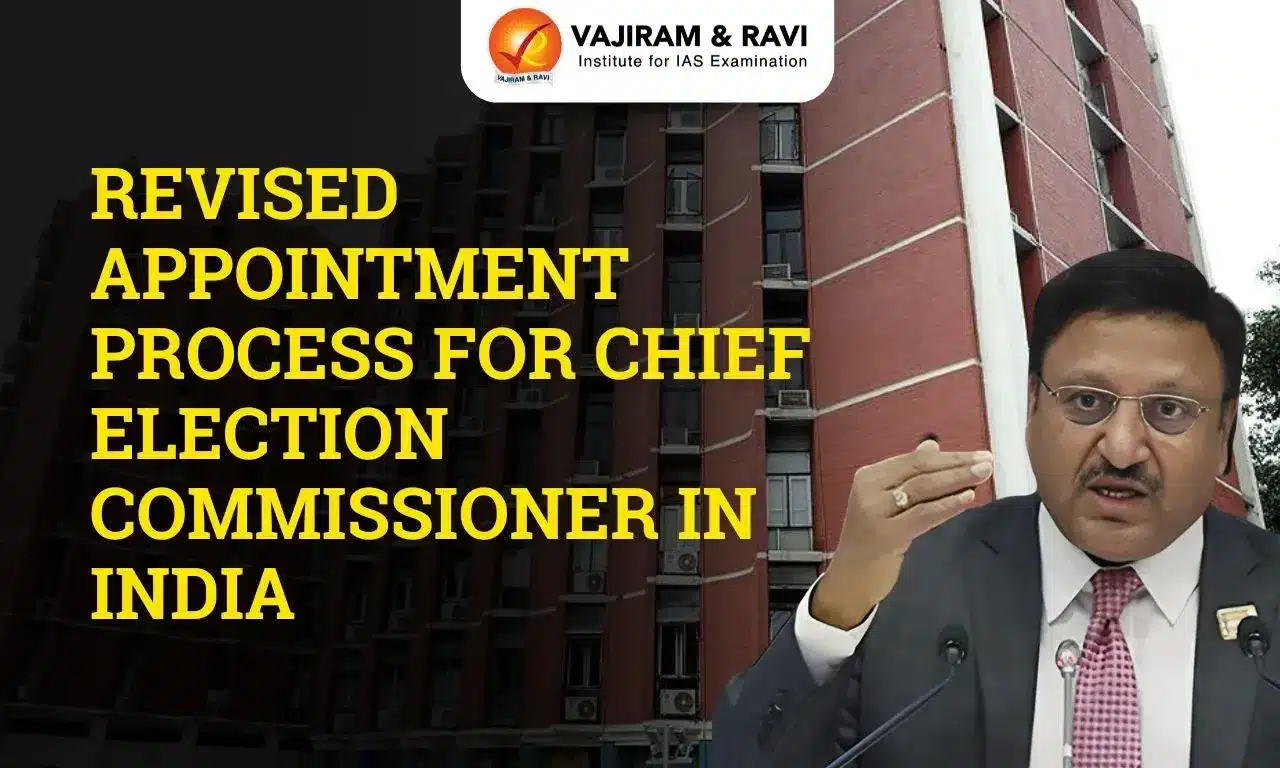What’s in Today’s Article?
- Background in which the New Law to Appoint CEC and ECs Introduced
- New Appointment Process Under the Act
- Implications of the Key Provisions of the Act
- Concerns Regarding Key Provisions of the Act
- Conclusion
Why in News?
- For the first time, the appointment of the Chief Election Commissioner (CEC) will move beyond the traditional seniority-based approach.
- The Chief Election Commissioner and Other Election Commissioners (Appointment, Conditions of Service and Term of Office) Act, 2023 has introduced new mechanisms to widen the scope of selection.
Background in which the New Law to Appoint CEC and ECs Introduced:
- Article 324 of the Indian Constitution specifies that while the CEC and ECs will be appointed by the President, this is subject to Parliamentary law (if such law exists).
- While this provision places an expectation on Parliament to draft a relevant law, it has not done so up (until now).
- In the absence of such a law, the President has been making appointments as per the recommendations of the Prime Minister.
- In 2023, the Constitution Bench of the SC (in the Anoop Baranwal v. Union of India case) decided to change the process for Election Commission appointments in order to secure their independence.
- The Bench created a committee comprising the PM, the Leader of the Opposition in Parliament, and the Chief Justice of India (CJI).
- This committee will make recommendations and advise the President on Election Commission appointments until Parliament enacts a separate law on the subject.
- Thus, the new law has been brought in consonance with the direction of the SC with regard to the appointment of CEC and ECs.
New Appointment Process Under the Act
- Structure of the Election Commission: The Election Commission includes the CEC and two Election Commissioners, currently Gyanesh Kumar and Sukhbir Singh Sandhu.
- Eligibility criteria: Section 5 restricts eligibility to current or former Secretary-level officers.
- Departure from tradition:
- Previously, the senior-most Election Commissioner succeeded the outgoing CEC.
- The Act allows the selection of candidates outside the Election Commission, broadening the pool.
- Search committee formation:
- Section 6 of the Act mandates a Search Committee, chaired by the Minister of Law and Justice, with two senior officials, to prepare a panel of five names.
- The committee’s recommendations are submitted to a Selection Committee.
- Selection committee composition:
- The Selection Committee includes the Prime Minister, a Cabinet minister, and the Leader of the Opposition in the Lok Sabha.
- This committee can choose from the panel or nominate an external candidate.
Implications of the Key Provisions of the Act:
- Government’s leeway: The Act allows the government flexibility in choosing the CEC amidst increasing scrutiny of the Election Commission.
- Debate likely:
- The Election Commission continues to face criticism from Opposition parties on issues like electoral rolls and electronic voting machines (EVMs).
- With the Leader of the Opposition on the panel, a debate over who is next is not ruled out.
Concerns Regarding Key Provisions of the Act:
- Exclusion of CJI:
- The Act responds to the SC’s 2023 ruling, which criticized the Executive’s exclusive control over appointments.
- Until Parliament enacted this law, appointments were advised by a committee including the CJI.
- The new Act omits the CJI from the Selection Committee, raising concerns about the potential erosion of institutional credibility.
- Potential for partisanship: Former CEC O P Rawat highlighted the risk of the system being influenced by political changes and decisions of previous governments.
- Legal challenges: Petitions challenging the exclusion of the CJI are pending in the SC, which will hear them in February 2025.
Conclusion:
- The Chief Election Commissioner and Other Election Commissioners (Appointment, Conditions of Service and Term of Office) Act, 2023 marks a significant shift in the selection process for the Election Commission.
- While it aims to enhance transparency and inclusivity, concerns about credibility and Executive overreach remain under scrutiny.
- The SC’s upcoming review will be pivotal in determining the future of this framework.
Q.1. What is Article 326 of the Indian Constitution?
Article 326 of the Constitution provides that the elections to the House of the People and to the Legislative Assembly of every State shall be on the basis of adult suffrage.
Q.2. What is special about the Sixty-first Amendment of the Constitution of India?
The Constitution (Sixty-first Amendment) Act, 1988, lowered the voting age of elections to the Lok Sabha and to the Legislative Assemblies of States from 21 years to 18 years.
Source: IE
Last updated on December, 2025
→ Check out the latest UPSC Syllabus 2026 here.
→ Join Vajiram & Ravi’s Interview Guidance Programme for expert help to crack your final UPSC stage.
→ UPSC Mains Result 2025 is now out.
→ UPSC Notification 2026 is scheduled to be released on January 14, 2026.
→ UPSC Calendar 2026 is released on 15th May, 2025.
→ The UPSC Vacancy 2025 were released 1129, out of which 979 were for UPSC CSE and remaining 150 are for UPSC IFoS.
→ UPSC Prelims 2026 will be conducted on 24th May, 2026 & UPSC Mains 2026 will be conducted on 21st August 2026.
→ The UPSC Selection Process is of 3 stages-Prelims, Mains and Interview.
→ UPSC Result 2024 is released with latest UPSC Marksheet 2024. Check Now!
→ UPSC Prelims Result 2025 is out now for the CSE held on 25 May 2025.
→ UPSC Toppers List 2024 is released now. Shakti Dubey is UPSC AIR 1 2024 Topper.
→ UPSC Prelims Question Paper 2025 and Unofficial Prelims Answer Key 2025 are available now.
→ UPSC Mains Question Paper 2025 is out for Essay, GS 1, 2, 3 & GS 4.
→ UPSC Mains Indian Language Question Paper 2025 is now out.
→ UPSC Mains Optional Question Paper 2025 is now out.
→ Also check Best IAS Coaching in Delhi

















